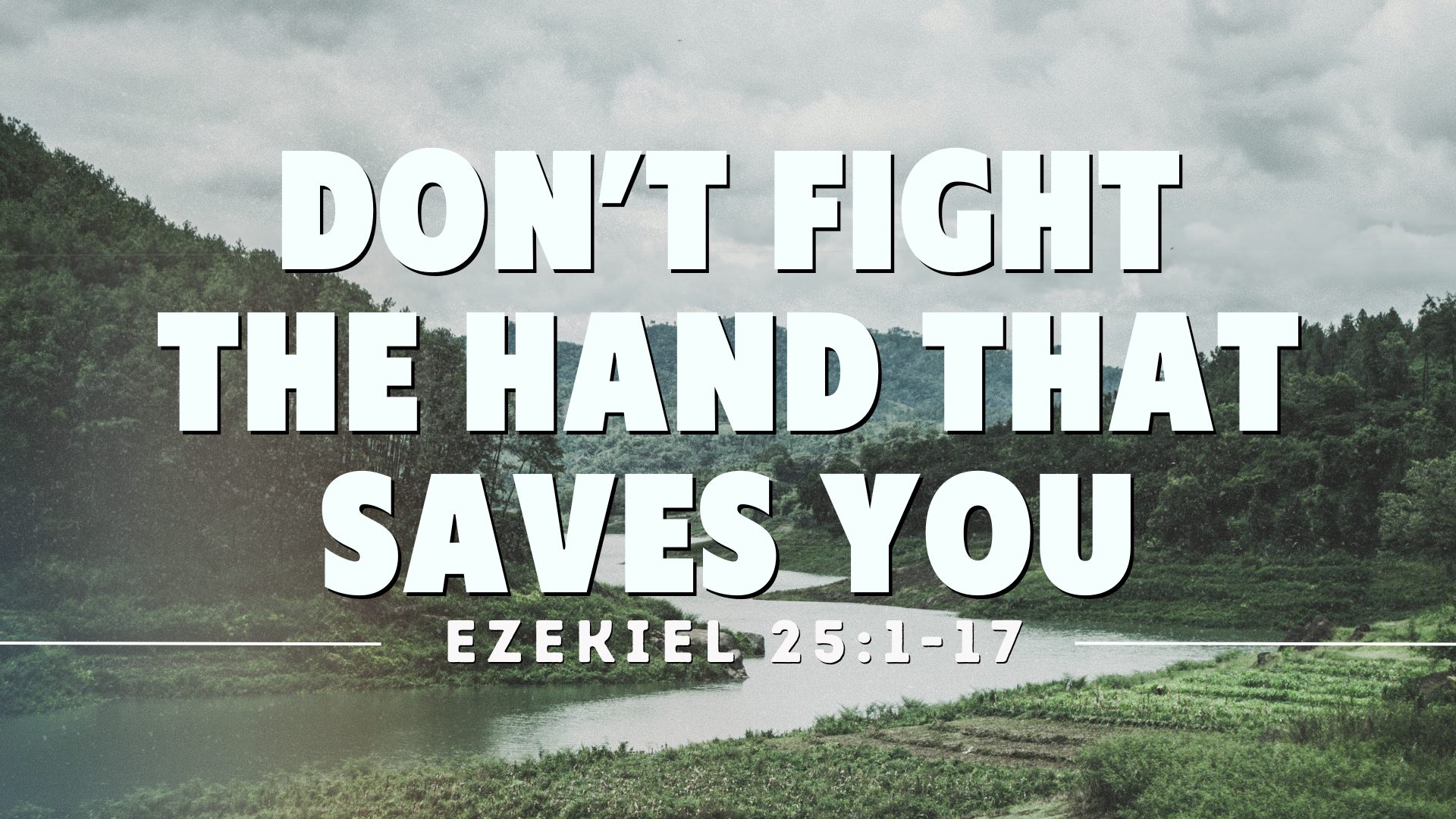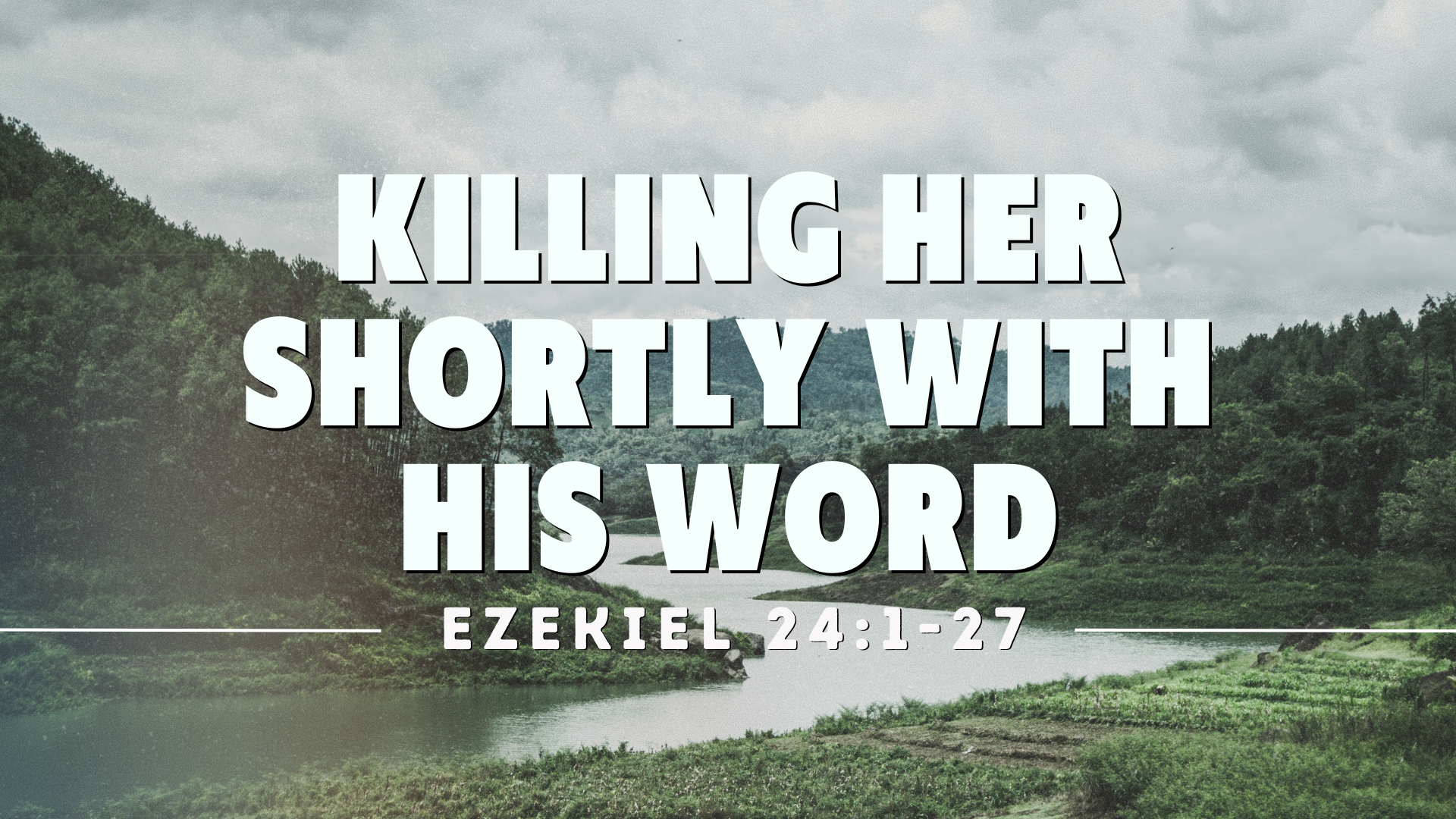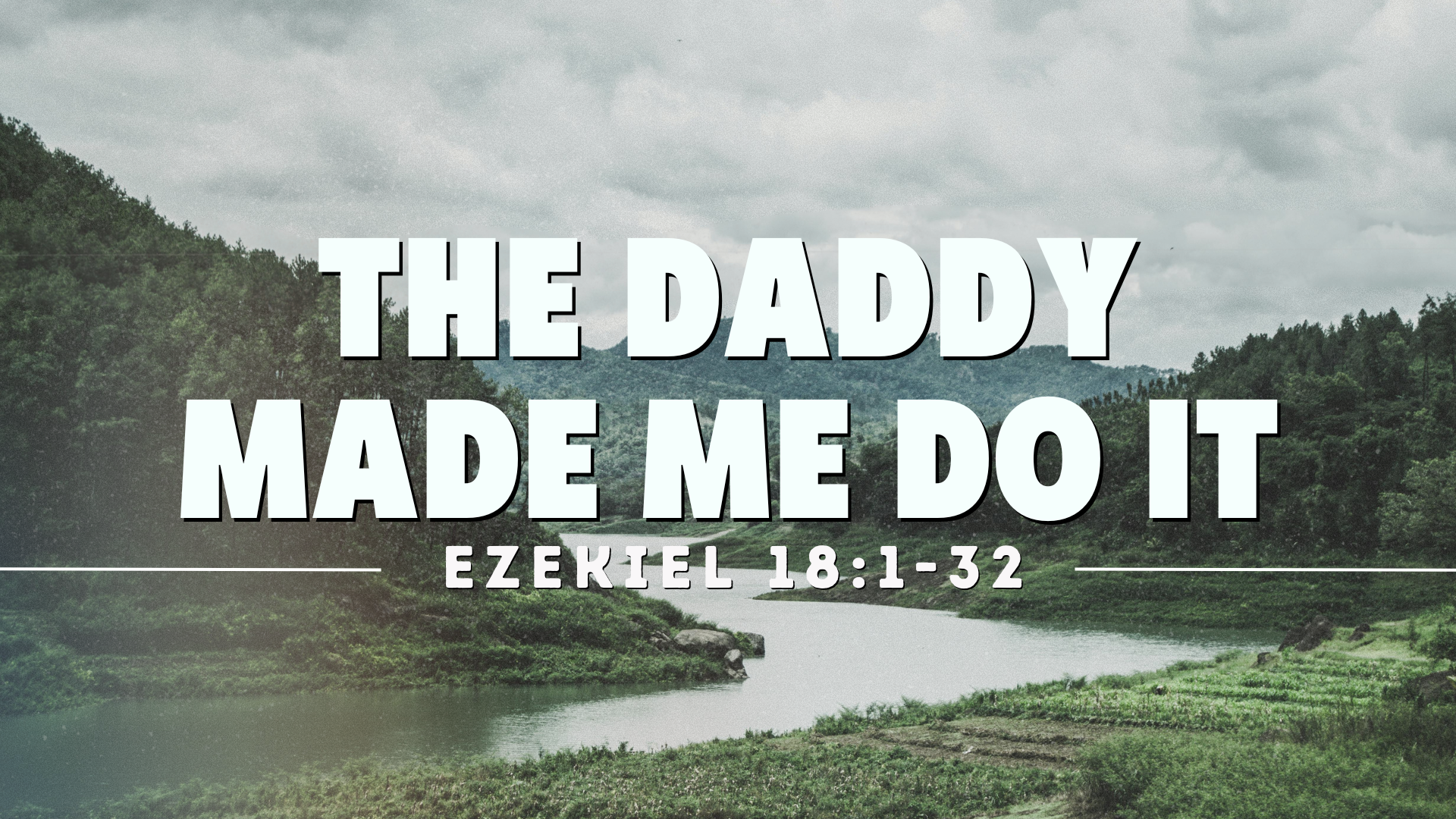
Don’t Fight The Hand That Saves You (Ezekiel 25:1-17)
Have you ever stopped to consider how many hand gestures we use on a daily basis?
Thumbs up/Thumbs down… Ok… Peace… Rock On (horns)… Come here… Stay back… Hold position… Power to _______ … Fingers crossed… Hang loose… Or telephone… Shhh… Lips zipped/sealed… Live long & prosper…
Depending on when & where you got saved you might have used the One Way gesture.
The LORD employs a gesture in our text.
- The LORD said to Ammon, “I will stretch out My hand against you” (v7).
- To Edom He said, “I will also stretch out My hand against Edom” (v13).
- He “will stretch out My hand against the Philistines” (v16).
This reference to the “outstretched hand,” or “outstretched arm,” is all over the OT. Twenty-five times worth. It mostly is used of the LORD when He has decided to exercise judgment. But it is also used to signify His mercy and gracious invitation. Context & usage must decide which.
I think we can see a bit of both. I’ll organize my comments around two points: #1God Stretches His Arm Out To Destroy Your Enemies, and #2 God Stretches His Arm Out To Discipline You.
#1 – God Stretches His Arm Out To Destroy Your Enemies
Have you ever tried to discipline someone else’s kid? Unless you are Chuck Norris, I don’t recommend it.
Five nations hostile to Israel – Ammon, Moab, Edom, Seir, and the Philistines – are punishable for their treatment of Israel without God’s permission. They opposed Israel out of hatred & spite.
Ezk 25:1 The word of the LORD came to me, saying,
Ezk 25:2 “Son of man, set your face against the Ammonites, and prophesy against them.
Ezk 25:3 Say to the Ammonites, ‘Hear the word of the Lord GOD! Thus says the Lord GOD: “Because you said, ‘Aha!’ against My Sanctuary when it was profaned, and against the land of Israel when it was desolate, and against the house of Judah when they went into captivity,
Ezk 25:4 indeed, therefore, I will deliver you as a possession to the men of the East, and they shall set their encampments among you and make their dwellings among you; they shall eat your fruit, and they shall drink your milk.
Ezk 25:5 And I will make Rabbah [capital city] a stable for camels and Ammon a resting place for flocks. Then you shall know that I am the LORD.”
Ezk 25:6 ‘For thus says the Lord GOD: “Because you clapped your hands, stamped your feet, and rejoiced in heart with all your disdain for the land of Israel,
Ezk 25:7 indeed, therefore, I will stretch out My hand against you, and give you as plunder to the nations; I will cut you off from the peoples, and I will cause you to perish from the countries; I will destroy you, and you shall know that I am the LORD.”
For a moment I thought I was reading the newspaper about anti-Israel protests at Columbia University… Or watching on TV one of those gatherings when our enemies shout their hatred for the US – the Great Satan – and Israel – the Little Satan.
When is the last time you met an Ammonite? The answer is Never. And you never will.
The gloating, the celebrating, at the misfortune of others is something all of us are capable of. Each time a leader in the Church fails & falls, there are professing Christians who smell blood in the water. Not the blood of Jesus, however – the blood that forgives and heals. We ought to be about restoration rather than retribution. When a person repents, is it right to reserve believing them until they bring forth fruits of repentance? If so, how long do we wait before we receive them?
Ezk 25:8 ‘Thus says the Lord GOD: “Because Moab and Seir [another name for the Edomites] say, ‘Look! The house of Judah is like all the nations,’
Ezk 25:9 therefore, behold, I will clear the territory of Moab of cities, of the cities on its frontier, the glory of the country, Beth Jeshimoth, Baal Meon, and Kirjathaim.
Ezk 25:10 To the men of the East I will give it as a possession, together with the Ammonites, that the Ammonites may not be remembered among the nations.
Ezk 25:11 And I will execute judgments upon Moab, and they shall know that I am the LORD.”
Something you should know about Moab & Ammon. After the destruction of Sodom and Gomorrah, Lot and his two daughters took refuge in a cave.[1] Speculating that they had no future husbands, the daughters got their father drunk and slept with him two nights in a row. The older daughter bore Moab, ancestor of the Moabites, and the younger bore Ben-Ammi, ancestor of the Ammonites.
Chalk up another big win for alcohol!
The Moabites & Edomites hated Israel’s status among the nations. They considered them just another nation. Consider the origins of each:
- Moab was born of incest. Not a good start.
- Esau & Jacob were twins. Esau was first out of the womb and therefore ought to have inherited the Israelite birthright. With help from his mama Rebecca, Jacob was able to steal the birthright.
- In a total contrast, Israel was born miraculously. When it was impossible naturally for Abraham & Sarah to conceive, God made it possible.
You had a natural birth. Every human being needs & can have a 2nd birth, a supernatural birth. You must be born-again. You are born the second time, born spiritually, when you believe that God loved the human race so much that He sent Jesus to die on the Cross and resurrect in order to save you.
Israel is not like the other nations. The apostle Paul writes, “to [Israel] pertain the adoption, the glory, the covenants, the giving of the law, the service of God, and the promises; of whom are the fathers and from whom, according to the flesh, Christ came, who is over all, the eternally blessed God. Amen”[2]
Everything God wished to share with humans ought to have come to them through Israel.
Ezk 25:12 ‘Thus says the Lord GOD: “Because of what Edom did against the house of Judah by taking vengeance, and has greatly offended by avenging itself on them,”
Ezk 25:13 therefore thus says the Lord GOD: “I will also stretch out My hand against Edom, cut off man and beast from it, and make it desolate from Teman; Dedan shall fall by the sword.
Ezk 25:14 I will lay My vengeance on Edom by the hand of My people Israel, that they may do in Edom according to My anger and according to My fury; and they shall know My vengeance,” says the Lord GOD.
Edom aided & abetted Babylon during the fall of Jerusalem. They cut-off their escape, killing fleeing Judahites who were historically their brothers.
We aid & abet our spiritual foes when we hinder believers who are escaping from sin.The most common way that we do this is by stumbling them. You have the freedom to partake of, and be involved with, anything that is not explicitly identified as sin. Maybe I don’t have that freedom, and therein lies the problem. If you exercise your freedom around me, I can be tripped-up by it.
Freedom is good and we don’t want to encourage rigid rule-keeping as a path of righteousness. Like everything else the ultimate solution is to “LOVE THE LORD YOUR GOD WITH ALL YOUR HEART, WITH ALL YOUR SOUL, AND WITH ALL YOUR MIND. This is the first and great commandment. And the second is like it: ‘YOU SHALL LOVE YOUR NEIGHBOR AS YOURSELF.’ ”[3]
Do that and you won’t stumble others, nor will you be stumbled.
You can also aid & abet the devil in stumbling yourself. Every time you choose to yield to the flesh and not to the indwelling Holy Spirit, you give evil a beachhead from which to operate. He then digs in and gains more & more territory.
Ezk 25:15 ‘Thus says the Lord GOD: “Because the Philistines dealt vengefully and took vengeance with a spiteful heart, to destroy because of the old hatred,”
Ezk 25:16 therefore thus says the Lord GOD: “I will stretch out My hand against the Philistines, and I will cut off the Cherethites [synonymous] and destroy the remnant of the seacoast.
Ezk 25:17 I will execute great vengeance on them with furious rebukes; and they shall know that I am the LORD, when I lay My vengeance upon them.” ’
Dr. Frasier Crane occasionally refers to uncultured people as “Philistines.” Pop-culture references like that are the only place the Philistines exist today
These five nations lost their power, land, and identity, just as God prophesied. No trace of them exists as independent nations today.
Prophesies made, Prophesies kept.
Thomas Constable commented, “This should be a warning to any nation that spitefully treats the Chosen People of God (i.e., Israel, the physical descendants of Jacob) and that sins against the sovereign God in other ways. He will punish sin and those who abuse His people.”
Let’s apply those two things as measure of the US:
- Are we allies or enemies with Israel? We can confidently answer, “Yes.”
- Are we obeying God? We can ashamedly answer, “No.”
Wait. I thought no one could obey, for example, the Ten Commandments. True, no one can obey them internally, from the heart, because our hearts are deceitfully wicked. Our only hope for salvation is for God to take our place in death as He promised in the Garden of Eden He would.
We can, and we must, obey God’s law outwardly. I will murder people in my heart until the day I am free from this fallen physical frame. But I am held to account if I act upon that and murder someone.
I’m worried about the fact that God says “do no murder.” The nations of the world, including us, are the most prolific murderers in history of mankind. Of course I’m referring to induced abortion on demand.
God destroyed and will destroy Israel’s enemies. While their enemies are destroyed, Israel will see it. That means they will endure. Yes they would have to endure much discipline. But all of God’s promises to them are “Yes! and “Amen.”
#2 – God Stretches His Arm Out To Discipline You
The outstretched arm that destroys enemies disciplines believers.
Three words might help bring this home to our hearts: Judgment, Justice, & Joy.
First, the LORD’s arm is outstretched against the human race signifying judgment. God’s justice must be satisfied. He is holy. We fall far short of being holy. We deserve to die in our sins. Jesus promised to come and take our place as a once-for-all sacrifice for our sins. He and He alone qualifies to save us because He was & remains forever God & man. He satisfies the justice of God as our Substitute. We are in Passover season. We don’t sacrifice lambs in order to approach God; Jesus is the lamb, He is our Passover.
Second, the Lord, Jesus, had His arms stretched-out when He took our place on the Cross. What appeared to be a total defeat was, in fact, the greatest triumph over the greatest of enemies. We read, “And you, being dead in your trespasses and the uncircumcision of your flesh, He has made alive together with Him, having forgiven you all trespasses, having wiped out the handwriting of requirements that was against us, which was contrary to us. And He has taken it out of the way, having nailed it to the cross. Having disarmed principalities and powers, He made a public spectacle of them, triumphing over them in it.”[4]
Third, His arms are reaching out, ready to receive & embrace. In the NT we read about a sinning son who returns home.[5] He has no hope of forgiveness. After all, he had despised and denied his father by asking to receive his inheritance early. “But when he was still a great way off, his father saw him and had compassion, and ran and fell on his neck and kissed him.” One commentator said, “This parable of the prodigal son is one of the clearest images of God’s open arms of mercy and welcome. The father does not just wait for the son – he runs to embrace him.”
Jesus said, “There is joy in the presence of the angels of God over one sinner who repents.”[6]
Jesus put His spin on outstretched hands. Speaking to the apostle Peter, after the resurrection, Jesus said, “When you are old, you will stretch out your hands, and another will gird you and carry you where you do not wish.” This He spoke, signifying by what death he would glorify God. And when He had spoken this, He said to him, “Follow Me.”[7]
Peter would be martyred by having his “hands” stretched out in crucifixion.
Here is something precious to bring out and examine often:
- Before salvation, God relates to sinners as a Judge, condemning them under His righteous law.
- But once a person is justified in Christ, God no longer judges them in a punitive sense. Instead, He relates to them as a Father, lovingly disciplining them for their growth in holiness.
- Reformed teachers like Spurgeon, Sproul, & Packer hold this to be true.
- Evangelical teachers like Billy Graham, A.W. Tozer, & Adrian Rogers likewise hold this to be true.
- J.I. Packer said, “Justification is a legal idea, conceived in terms of law, and viewing God as judge. Adoption is a family idea, conceived in terms of love, and viewing God as Father.”
- Tozer said, “The justice of God stands against the sinner as an unmovable wall. But in Christ, that wall is removed, and He is no longer a judge to condemn, but a Father to correct and lead.”
If you are not a believer, God’s arms remain stretched out in judgment.
If you are a believer, it is because you looked to the Cross and Jesus’ hands stretched out to save you.
Stretch your hands upward in rejoicing.








